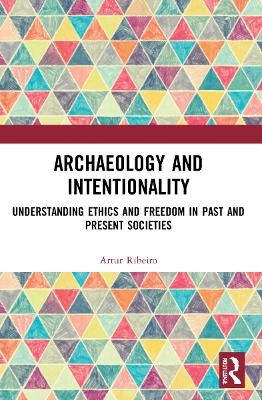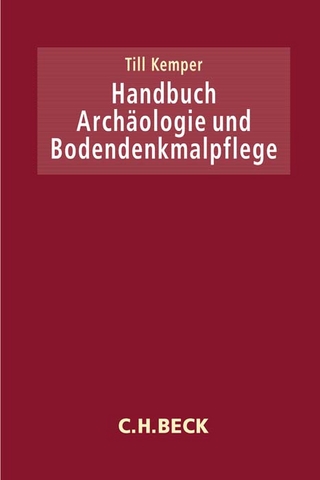
Archaeology and Intentionality
Understanding Ethics and Freedom in Past and Present Societies
Seiten
2023
Routledge (Verlag)
978-0-367-72633-1 (ISBN)
Routledge (Verlag)
978-0-367-72633-1 (ISBN)
Archaeology and Intentionality explores perhaps one of the most overlooked topics in archaeology, that of intentionality. In archaeology, most explanations of human behaviour rely on intentionality and this book fills a surprising gap in the literature.
Archaeology and Intentionality explores perhaps one of the most overlooked topics in archaeology, that of intentionality. In archaeology, most explanations of human behaviour rely on intentionality, and this book fills a surprising gap in the literature.
By identifying the historical trajectory of the notion of intentionality, this book reframes our understanding of what it means to act intentionally and how archaeologists provide explanations concerning past (and present) societies. In general, this book presents a strong framework for archaeological research, one that fits to current archaeological practices and research around the world. This framework considers that past actors were not unconditional free agents, who could act however they wished, nor were they absolute prisoners of the economic, biological, and environmental circumstances in which they lived. From the standpoint of intentionality, it becomes clear that human agency is not about what you can or cannot do, but about what you should do, that is to say, actions are above all ethical. In a world wealth inequality runs rampant, where humans have damaged the environment beyond recognition, and where technology advances at an alarming rate, it is important that we recognize our intentions and the ethical responsibility that accompanies those intentions. The book highlights how archaeology is the perfect discipline to understand how and from where those intentions come.
Addressing several problems in archaeological theory and connecting archaeology, philosophy, and social theory, this book is for students and researchers interested in archaeological theory and how it informs practice.
Archaeology and Intentionality explores perhaps one of the most overlooked topics in archaeology, that of intentionality. In archaeology, most explanations of human behaviour rely on intentionality, and this book fills a surprising gap in the literature.
By identifying the historical trajectory of the notion of intentionality, this book reframes our understanding of what it means to act intentionally and how archaeologists provide explanations concerning past (and present) societies. In general, this book presents a strong framework for archaeological research, one that fits to current archaeological practices and research around the world. This framework considers that past actors were not unconditional free agents, who could act however they wished, nor were they absolute prisoners of the economic, biological, and environmental circumstances in which they lived. From the standpoint of intentionality, it becomes clear that human agency is not about what you can or cannot do, but about what you should do, that is to say, actions are above all ethical. In a world wealth inequality runs rampant, where humans have damaged the environment beyond recognition, and where technology advances at an alarming rate, it is important that we recognize our intentions and the ethical responsibility that accompanies those intentions. The book highlights how archaeology is the perfect discipline to understand how and from where those intentions come.
Addressing several problems in archaeological theory and connecting archaeology, philosophy, and social theory, this book is for students and researchers interested in archaeological theory and how it informs practice.
Artur Ribeiro is a research fellow at the University of Kiel, Germany. His work focuses on prehistoric Iberia and the philosophical traditions of Central Europe.
List of Figures; Acknowledgements; Preface; 1. Archaeology and the study of the mind; 2. Intentionality and the Brain; 3. Past societies and the landscape of action; 4. The conception of free-will, constraint, and freedom; 5. Understanding normativism; 6. Freedom and responsibility; 7. The Tyranny of ontology; 8. A guide to intentionality for archaeologists; Bibliography; Index.
| Erscheinungsdatum | 07.02.2022 |
|---|---|
| Zusatzinfo | 1 Line drawings, black and white; 7 Halftones, black and white; 8 Illustrations, black and white |
| Verlagsort | London |
| Sprache | englisch |
| Maße | 156 x 234 mm |
| Gewicht | 453 g |
| Themenwelt | Geisteswissenschaften ► Archäologie |
| ISBN-10 | 0-367-72633-5 / 0367726335 |
| ISBN-13 | 978-0-367-72633-1 / 9780367726331 |
| Zustand | Neuware |
| Informationen gemäß Produktsicherheitsverordnung (GPSR) | |
| Haben Sie eine Frage zum Produkt? |
Mehr entdecken
aus dem Bereich
aus dem Bereich
maternal health science and the reproduction of harm
Buch | Softcover (2024)
University of California Press (Verlag)
37,40 €
Holocaust heritage, noncitizen futures, and black power in Berlin
Buch | Softcover (2022)
University of California Press (Verlag)
37,40 €


